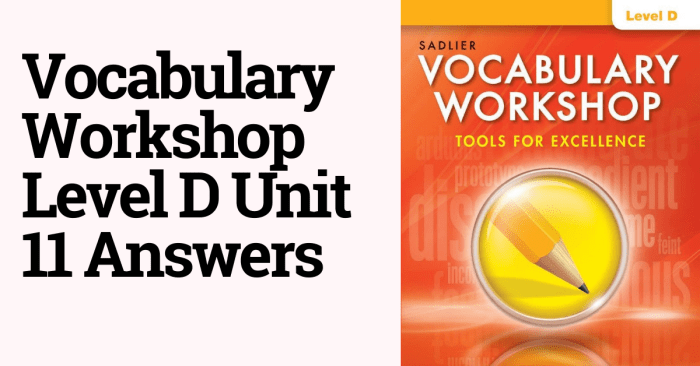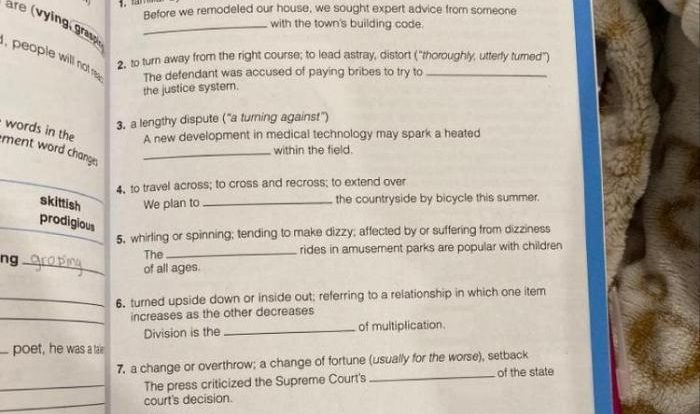Prepare to embark on an exciting linguistic journey with Vocab Workshop Level D Unit 3! This comprehensive guide unlocks the doors to a treasure trove of new words, offering a wealth of engaging activities to help you master their meanings and usage.
Get ready to expand your vocabulary and enhance your communication skills with this dynamic learning experience.
As we delve into the depths of Unit 3, we will explore a diverse range of vocabulary words, delving into their definitions, nuances, and real-world applications. Through interactive games, puzzles, and writing exercises, you will actively engage with the new words, solidifying their meanings in your mind.
Vocabulary Words: Vocab Workshop Level D Unit 3
Vocabulary is the foundation of communication. In this unit, we will explore the meanings of some commonly used words in English. Understanding these words will help you expand your vocabulary and improve your communication skills.
List of Vocabulary Words
| Word | Definition | Example Sentence |
|---|---|---|
| Acquire | To obtain or gain something | I acquired a new skill in my job. |
| Captivating | Very interesting or attractive | The movie was so captivating that I couldn’t take my eyes off the screen. |
| Conspicuous | Easily seen or noticed | The large red car was conspicuous in the parking lot. |
| Exuberant | Full of energy and excitement | The children were exuberant after winning the game. |
| Impeccable | Without any errors or faults | Her manners were impeccable. |
| Ingenuity | The ability to think creatively and solve problems | The engineer’s ingenuity helped solve the complex problem. |
| Magnificent | Very impressive or beautiful | The sunset was magnificent. |
| Perseverance | The ability to continue trying even when faced with difficulties | His perseverance helped him achieve his goals. |
| Resilient | Able to withstand or recover from difficult situations | The community was resilient after the natural disaster. |
| Zealous | Very enthusiastic or passionate about something | She was zealous about her work. |
Word Study Activities
To make learning vocabulary enjoyable and effective, incorporate engaging activities that cater to different learning styles. These activities can include games, puzzles, and writing exercises that reinforce the meaning and usage of new words.
Interactive Games
- Word Charades:Write down vocabulary words on slips of paper. Have students take turns acting out the words while their team guesses.
- Vocabulary Bingo:Create bingo cards with vocabulary words. Call out definitions or sentences using the words, and students mark off the corresponding squares.
- Word Puzzles:Design crossword puzzles, word searches, or anagrams that feature the vocabulary words.
Collaborative Writing Exercises
- Storytelling:Divide students into groups and assign each group a set of vocabulary words. Have them create a short story incorporating the words.
- Vocabulary Dialogues:Pair up students and have them write dialogues using the vocabulary words in context.
- Word Definitions:Have students work together to define the vocabulary words using their own words and examples.
Word Usage in Context

Words come alive when we see them in action! Understanding how vocabulary words are used in real-world contexts helps us grasp their nuances and apply them effectively in our own writing and speech.
Let’s dive into some examples to witness the power of words in context.
Excerpts from Texts
Literature and non-fiction texts are treasure troves of vocabulary in context. Consider this excerpt from a novel:
“The tempestuous winds howled through the desolate landscape, tearing at the flimsy tents and sending shivers down our spines.”
Here, “tempestuous” aptly describes the violent nature of the wind, while “desolate” paints a vivid picture of the barren and inhospitable surroundings. These words immerse us in the scene, allowing us to feel the force of the storm.
Scenarios in Everyday Life
Vocabulary words aren’t confined to books; they play a vital role in our daily interactions. Imagine this scenario:
Your friend is feeling down, and you want to express your concern. You might say, “I’m here for you if you need a sympathetic ear.” In this context, “sympathetic” conveys your empathy and understanding of their feelings.
Nuances and Connotations
Words often carry subtle shades of meaning depending on the context. For example, “bright” can describe a sunny day or an intelligent person. In the first case, it refers to physical luminosity, while in the second, it implies mental sharpness.
Continuing our journey through Vocab Workshop Level D Unit 3, we encounter the term “man-made fibre.” If you’re struggling to unravel this crossword clue, fear not! Check out this resource to help you find the missing word. As we delve deeper into Unit 3, we’ll uncover more captivating vocabulary that will expand our linguistic horizons.
Assessment and Evaluation

To evaluate students’ understanding of the vocabulary words, various assessment tasks can be implemented, such as quizzes, essays, and presentations. Each task should be designed to assess different aspects of vocabulary knowledge, and clear rubrics or grading criteria should be provided to ensure fair and consistent evaluation.
Quizzes
- Multiple-choice quizzes can test students’ ability to recognize the correct meaning of vocabulary words in context.
- Fill-in-the-blank quizzes can assess students’ ability to recall and use vocabulary words accurately.
- Short-answer quizzes can require students to define or explain vocabulary words, demonstrating their comprehension.
Essays
Essays provide an opportunity for students to demonstrate their understanding of vocabulary words in a more comprehensive way.
- Students can write essays that use vocabulary words in context, demonstrating their ability to apply their knowledge to writing.
- Essays can also focus on the etymology or history of vocabulary words, encouraging students to explore the deeper connections between language and meaning.
Presentations, Vocab workshop level d unit 3
Presentations allow students to showcase their understanding of vocabulary words in a creative and engaging manner.
- Students can create presentations that explain the meaning and usage of vocabulary words, using visuals and examples.
- Presentations can also involve students creating skits or role-plays that demonstrate the application of vocabulary words in real-life situations.
Rubrics and Grading Criteria
Clear rubrics or grading criteria should be established for each assessment task, outlining the expectations for student performance.
- Rubrics should include criteria for accuracy, completeness, and clarity of responses.
- Grading criteria should be aligned with the learning objectives and assessment tasks, ensuring that students are evaluated fairly.
Question & Answer Hub
What is the primary focus of Vocab Workshop Level D Unit 3?
The primary focus is on expanding vocabulary, improving word usage, and developing communication skills through engaging activities.
What types of activities are included in the unit?
The unit includes interactive games, puzzles, writing exercises, and real-world examples to help students learn and practice the vocabulary words.
How can I assess my progress in the unit?
The unit provides various assessment tasks, such as quizzes, essays, and presentations, to evaluate students’ understanding of the vocabulary words.

